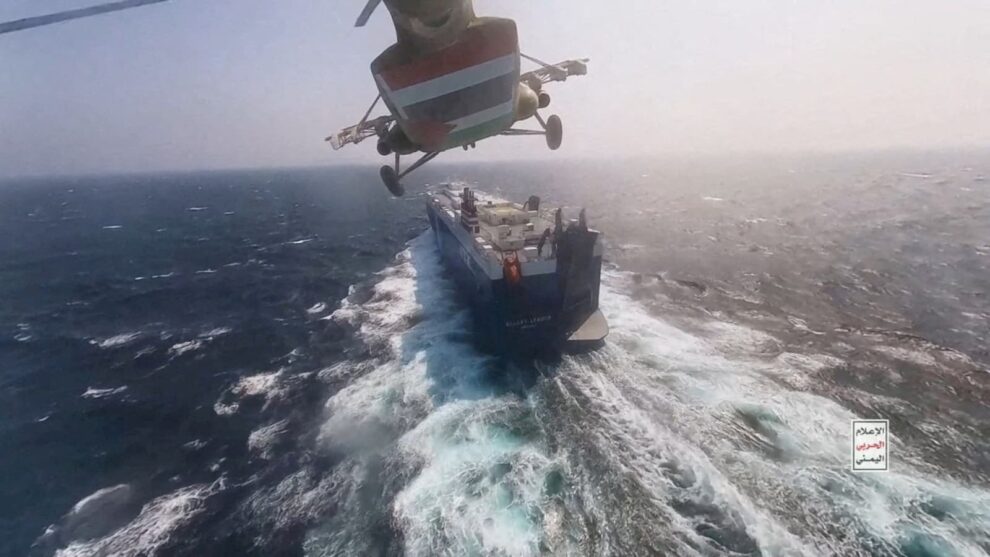Britain, which is part of around 20 countries which have joined the US’s multinational naval coalition to tackle Houthi attacks in Red Sea, said on Sunday it would spend 405 million pounds ($514 million) to upgrade a missile system to shoot down hostile drones over the water body, news agency Reuters reported.
The Sea Viper Air Defence system, currently being used by the Royal Navy, features a new warhead and software enabling it to counter ballistic missile threats, the UK Defence Ministry said in a statement.
The Yemen-based Houthis backed by Iran, since November, have been launching attacks on the Red Sea, saying those were targeted at Israeli vessels in support of Palestinians in the Gaza Strip amid the ongoing Israel-Hamas war. Subsequently, the Houthi rebels declared US and UK interests to be legitimate targets as well.
US and British naval forces in the Red Sea have shot down drones and missiles fired by Houthis this month as the Israel-Hamas conflict escalated into a broader Middle East crisis.
Here are the latest developments in the Red Sea crisis:
- US Central Command forces on Saturday struck a Houthi anti-ship missile, which was aimed into the Gulf of Aden and was prepared to launch. “US forces determined the missile presented a threat to merchant vessels and U.S. Navy ships in the region, and subsequently struck and destroyed the missile in self-defense,” the US Central Command tweeted.This was the latest round of strikes after the US struck three other Houthi anti-ship missiles.
- Commanders from Iran’s Islamic Revolutionary Guards Corps (IRGC) and Lebanon’s Hezbollah group are on the ground in Yemen, helping to direct and supervise Houthi attacks on Red Sea shipping, news agency Reuters reported, citing sources. Iran increased its arms supply to the Houthis in wake of the Israel-Hamas war in the Gaza Strip.These weapons include advanced drones, precision-strike ballistic missiles, medium-range missiles, and anti-ship cruise missiles. The IRGC commanders and advisers are also offering the Houthis know-how, data and intelligence support to determine which of the dozens of vessels passing through the Red Sea every day are en route to Israel, thereby becoming targets of the Yemen-based rebel group, the Reuters report added.
- The US has consistently stressed that Iran was heavily involved in planning the operations against shipping in the Red Sea, adding that its intelligence was vital in aiding Houthis target the ships. In response to IRGC and Hezbollah being on ground in Yemen, Washington reiterated their claim. However, in a news briefing this week, Iranian Foreign Ministry spokesman Nasser Kanaani repeatedly refuted Tehran’s involvement in the Red Sea crisis.
- Saudi Arabia’s Foreign Minister Prince Faisal bin Farhan told CNN in an interview that the Red Sea crisis triggered by Houthi attacks and the US’s counterstrikes could spiral out of control and escalate the conflict in the region. “We are in a very difficult and dangerous time in the region, and that’s why we are calling for de-escalation,” he said in the interview, noting that Saudi Arabia is “very worried” over the Red Sea developments.The Houthi attacks on the Red Sea since November last year have slowed trade between Asia and Europe, with ships forced to take the much longer and cost-heavy Africa route.
- Amid the Red Sea tension, the US government recently relisted Houthi rebels as a terrorist group. In a statement on Wednesday (January 17), the US said, “These attacks (by Houthis on the Red Sea) against international shipping have endangered mariners, disrupted the free flow of commerce, and interfered with navigational rights and freedoms. This designation seeks to promote accountability for the group’s terrorist activities. If the Houthis cease their attacks in the Red Sea and Gulf of Aden, the United States will reevaluate this designation.”
Source: India Today











